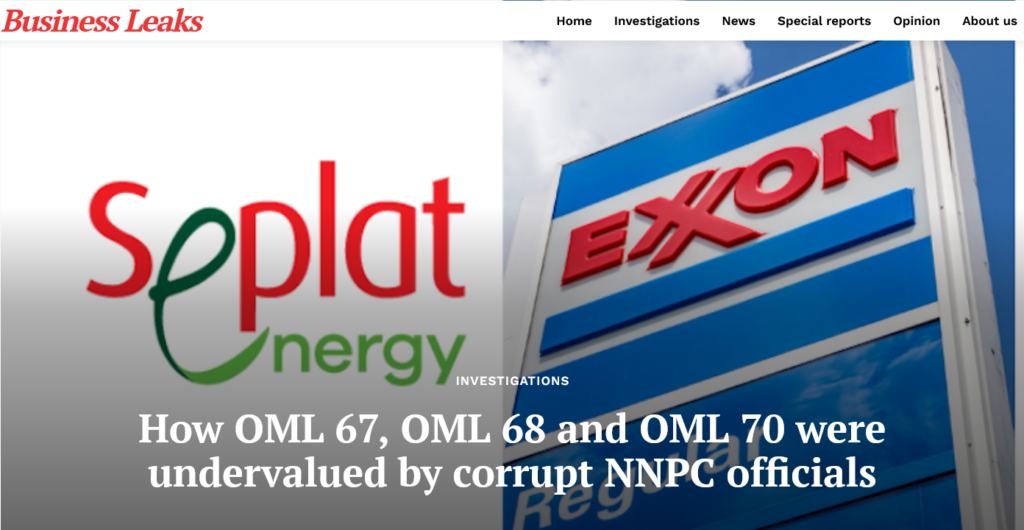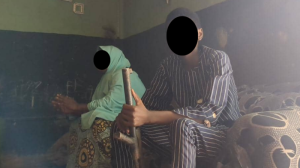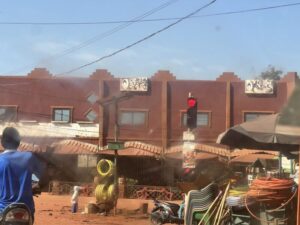By Emmanuel Mayah
- rejected consortium offered $2.25 billion higher than preferred bidder
- the real reason ExxonMobil-Seplat deal is blockaded
In the Nigerian oil industry, cases of elephants passing through the eye of the needle are hardly uncommon. Everyday transactions are riddled with paradox. The insider details would make the Brazil’s “Car Wash” looks like a child play.
Nigerians may still be reeling from the aftershock of the super-tanker theft of crude oil intercepted in Equatorial Guinea, however, emerging details of the botched ExxonMobil-Seplat oil assets acquisition would make the estimated 400,000 bpd (barrels per day) crude heist pale into insignificance.
When Mele Kyari, Group CEO of Nigerian National Petroleum Commission Limited (NNPCL) – formerly Nigeria National Petroleum Corporation, NNPC – led an offensive that torpedoed a deal that would have allowed Seplat Energy Plc to acquire the entire offshore shallow water portfolio of ExxonMobil in Nigeria, one of the reasons given for the counter was that NNPCL was exercising its pre-emptive rights over the contentious assets.
In July 2022 a Federal High Court judge in Abuja granted NNPCL an order of interim injunction stopping ExxonMobil from selling its assets in Nigeria to Seplat. In February 2022 Seplat had announced an agreement to acquire the entire share capital of Mobil Producing Nigeria Unlimited (MPNU) from the American Exxon Mobil Corporation, Delaware, for $1.28 billion. Had the deal succeeded it would have been for Seplat a rich acquisition of a unit of ExxonMobil that operates multiple licenses in Nigeria.
The rich oil asset was expected to deliver a 186 per cent increase in production from 51,000 bpd to 146,000 bpd or a 170 per cent increase in 2P liquids reserves, from 241 MMbbl to 650 MMbbl. Also the acquisition was expected to deliver a 14 per cent increase in 2P gas reserves from 1,501 Bscf to 1,712 Bscf, in addition to a significant undeveloped gas potential of 2,910 Bscf (JV: 7,275 Bscf) What more it would increase by 89 per cent, the total 2P reserves from 499 MMboe to 945 MMboe, including offshore fields with dedicated, MPNU-operated export routes offering enhanced security and reliability.
The abbreviations Mbbl and MMbbl refer to one thousand and one million barrels respectively. Bscf stands for Billions of Standard Cubic Feet of gas – equivalent to 1,000,000,000 standard cubic feet (nine zeros).
MMboe means millions (106) of barrels of oil equivalent. It is used to measure dry gas volumes, defined as ‘C4 minus’ hydrocarbon components and non-hydrocarbon volumes that are present in sales product. They are first converted to oil equivalent volumes via a constant conversion factor.
Industry experts say that this oil asset located in Akwa Ibom State is something to die for. While NNPC Limited in public statements is hell-bent on its pre-emptive rights, the real reason for its opposition to the ExxonMobil-Seplat deal is that the oil wells were grossly undervalued years past by people at the helms of NNPC, particularly the Department of Petroleum Resources (now called the Nigerian Upstream Petroleum Regulatory Commission, NUPRC). It is a story that both NNPC Limited and NUPRC would not want Nigerians to know about. BUSINESS LEAKS has the details.
Sweetheart deals in award of OMLs 67, 68 and 70
The real reason NNPC Limited is jumping hoops to stop the ExxonMobil-Seplat deal has its roots in an incident that happened in 2009. Mobil Producing Nigeria Unlimited (MPN) is one of ExxonMobil’s three Nigerian subsidiaries. The others are Esso Exploration and Production Nigeria Limited and Esso Exploration and Production Nigeria (Offshore East) Limited.
MPN is the second largest oil producer in Nigeria after Shell. The Company operates a Joint Venture (JV) with the NNPC, through which it operates over 90 offshore platforms comprising approximately 300 producing wells, based in the Akwa Ibom and Rivers states in the Niger Delta. MPN is a 40 percent partner in the JV with the NNPC holding the remaining 60 percent interest.
In 2009, the licences for three oil blocks held by Mobil Producing Nigeria – OMLs 67, 68 and 70 – were allegedly irregularly extended for a further 20 years by Nigeria’s Petroleum Ministry. OML stands for Oil Mining Lease.
The licence extension was allegedly awarded to Mobil despite there being a higher bid submitted for the oil blocks by Sunrise Power and Transmission Company Limited.
Sunrise Power and Transmission Company Limited is a Nigeria-incorporated consortium of local and Chinese entities including the China National Offshore Oil Corporation (CNOOC). The bid submitted by Sunrise Power was USD 2.25 billion higher than that submitted by Mobil.
MPN has denied these allegations, stating that it fully complied with the requirements for renewal of oil mining licences in Nigeria. The licence extension was reportedly the subject of an inquiry by former Nigerian oil minister, Diezani Alison-Madueke.
Up till 2016, these allegations were the subject of an investigation by the Economic and Financial Crime Commission (EFCC). The investigation however lost steam afterwards.
Last year however, the EFCC directed a new and different investigation at a man called Richard Laing. He is ExxonMobil’s boss in Nigeria. The financial crime agency in February 2021 announced that the Federal High Court in Abuja had granted an application for warrant for the arrest of Laing.
Barely six months earlier in August 2020, Richard Laing, a British oil and gas professional, was appointed as the chairman and managing director of ExxonMobil’s three Nigerian subsidiaries, including MPN.
Laing is a long-term employee of ExxonMobil, having joined the company in 1988 as an engineer. He has been employed at ExxonMobil’s Nigerian operations since 2017, when he was appointed as the executive director and production manager in ExxonMobil’s Upstream Nigeria division.
The arrest warrant was related to an EFCC investigation into alleged procurement fraud of over USD 213 million on a pipeline construction project termed the Major Integrity Pipelines Project, for which MPN was the contracting agency.
The EFCC had noted that its investigation was into MPN and that the warrant was intended to compel Laing to appear for questioning.
The warrant was issued after Laing failed to appear before the EFCC despite three previous requests from the agency.
The project involved Mobil Producing Nigeria as the contracting company, Suffolk Petroleum Services Limited (SPSL) as the main contractor. Three other companies namely Saipem Contracting Nigeria, Global Offshore Limited and Van Ord were the sub-contractors to SPSL.
At issue, was the fraudulent creation of Change Orders worth over USD 213 million.
Selling a limousine for the price of a bicycle
The OMLs 67, 68 and 70 that Mobil Producing Nigeria was alleged to have received renewal under questionable circumstances are the same OMLs ExxonMobil wants to transfer to Seplat. Recalling the 2009 controversial bid, an industry insider who requested his name be kept off this report told BUSINESS LEAKS that the roles of top NNPC and government functionaries in the OPLs renewal were tantamount to an economic coup against the Nigerian state. He said:
“In my almost 31 years in this business, I have seen at close range how bids are rigged in Nigeria but honestly, nothing compares to the 2009 incident. There is no parallel; nothing as brazen and nothing as outrageous.
“How can it be said that a consortium offered a whooping USD 2.25 billion higher than what MPN put on the table yet the lower bid was accepted by the government lessors as the preferred bid. It is akin to selling a limousine for the price of a bicycle.”
“Worst still, it is the same 3 OMLs, with another (OML 104) to boot that are being offered to Seplat for USD 1.283 billion. Mele Kyari considers ExxonMobil’s divestment as freebies to whoever buys it but NNPC had long shot itself in the foot. Simply put, corruption once sweet in their mouth (NNPC officials) has turned full circle to become sour.”
By NNPCL’s own estimation, the valuation of the assets is way too low. The four OMLs are said to still hold about 550 million barrels. Production is about 85,000 barrels per day. Under the proposed deal, ExxonMobil would receive $1.3 billion payment with an additional $300 million if proposed production targets were met. Should the sale manage to sail through the oil blocks would then have come at a value less than $3 per barrel. It is the extreme of low prices given current oil prices of around $100 per barrel.
BUSINESS LEAKS gathered that the controversial OMLs renewal was executed at a time when President Umaru YarÁdua had become terminally ill. The arrowhead of the kitchen cabinet that delivered the deal was Mohammed Barkindo who in 2009 had become the all-powerful Group Managing Director (GMD) of NNPC. In a separate investigation recently concluded by this reporter, Barkindo’s name appeared on documents showing how 125 million barrels of crude oil disappeared within 15 months under his watch.
Curiously the 125 million barrels disappeared under another joint venture (JV) of NNPC – this time with Vitol, a leading oil trader. President Mohammadu Buhari later appointed Barkindo to represent Nigeria at the OPEC (Organization of the Petroleum Exporting Countries) where he served as the Secretary-General from 2016 till his death in July 2022.
Cloak and dagger affairs at NNPC Limited
As the extremely undervalued OMLs become a coveted prize, the battle to possess it has turned the new NNPCL to a cloak and dagger business. On one side of two opposing camps are Mele Kyari and his henchmen who at a point enlisted the Presidency to thwart the deal. The President once gave his approval of the deal but withdrew same in a matter of hours.
NUPRC’s Managing Director, Gbenga Komolafe – supported by Timipre Sylva, Minister of State for Petroleum – is said to be on the side of Seplat. Ironically, the Commission that he heads fiercely opposes his position in public. The NUPRC on 16 May declined to approve the sale.
BUSINESS LEAKS further gathered that ExxonMobil’s efforts to divest its MPN’s assets quietly began in 2019. The National Petroleum Investment Management Services (NAPIMS) was subsequently prompted to oversee the sale. About 40 companies quietly submitted bids. Twenty-Seven of them were shortlisted. Among them were First E&P, Eroton and Petralon.
The process soon ran into a ditch. None of the companies shortlisted by ExxonMobil was owned by northerners. Many on the list had Lagos and the Niger Delta as their origin but were picked by ExxonMobil with capacities as foremost consideration.
First E&P is owned by Odein Ajumogobia, a former minister of state for Petroleum Resources. Eroton is owned by fertilizer magnate Onajite Paul Okoloko while Petralon is chaired by Ahonsi Unuigbe.
ExxonMobil was told in no uncertain terms that there was no way President Buhari and his omnipotent Chief of Staff, Abba Kyari, would lend their signatures to a transaction that would have no geopolitical benefit to his northern kinsmen.
In the hey days of Diezani Madueke as oil minister, a similar exhibition of poor emotional intelligence cost Crestar an oil deal with Shell Petroleum Development Company. Shell had picked Crestar as its preferred bidder to acquire OML 25.
Diezani withdrew ministerial consent required for Shell to go ahead because Crestar’s Chairman, Osten Olorunsola, was not in her good book. Just months before the acquisition talk, Diezani had fired Olorunsola from his position as Head, Department of Petroleum Resources.
Beneficial owners of Seplat
The head of the table at Seplat is Ambrosie Bryant Chukwueloka (ABC) Orjiako. A medical doctor and qualified orthopedic and trauma surgeon, he in 2009 co-founded Seplat Energy Plc (formerly Seplat Petroleum Plc). His co-founders are Platform Petroleum Limited and Shebah Exploration and Production Company. Until May 2022, Ambroise Bryant had been Chairman of Seplat since inception.

In July 2010, SEPLAT acquired a 45 percent participating interest in, and was appointed operator of, a portfolio of three onshore producing oil and gas blocks in the Niger Delta (OMLs 4, 38 and 41) which include numerous producing fields.
In June 2013, SEPLAT acquired an interest in the Umuseti/Igbuku marginal field area within OPL 283 and in February 2015 acquired interests in OML 53 and OML 55.
Alongside its oil business the company was quick to begin commercial utilization of the substantial gas reserves that exist in its blocks. In 2015, SEPLAT installed and commissioned a new 150 million cubic feet per day (4.2 million cubic metres per day) at standard conditions gas processing facility at its Oben hub, taking gross overall processing capacity from 150 to 300 million cu ft/d (4.2 to 8.5 million m3/d).
In 2016 the Oben gas processing facility was expanded with the installation of additional 225 million cu ft/d (6.4 million m3/d) processing modules. The expansion projects have increased SEPLAT’s gross gas processing capacity to 525 million cu ft/d (14.9 million m3/d), making the company a leading supplier of natural gas to the Nigerian market.
On February 8, 2015, it was announced that Seplat had purchased stakes in two onshore Nigeria blocks from Chevron Nigeria for a combined $391.6 million.
Behind-the-scene-efforts to rescue the deal
Notwithstanding the note of finality from NNPCL and NUPRC, BUSINESS LEAKS gathered that efforts are being made behind the scene to salvage the ExxonMobil-Seplat deal. ExxonMobil is anxious to rejig its negotiation team. A woman by name Toyin Longe would be part of the last-ditch effort.

BUSINESS LEAKS further gathered that Toyin Longe is familiar with the power corridor in Nigeria. Her knowledge of the country cuts across the business and the political, having worked in Nigeria as a sales analyst for ExxonMobil between 2009 and 2013.
At Seplat Ambroise Bryant may have stepped down as Chairman just last May, he remains on the scene as adviser. The success story of Seplat is traceable to Bryant’s clinical training in precision and in finding solutions.
He has been linked with controversial figures but somehow manages to uphold best practices. He has been linked with Dan Etete and Mohammed Abacha, son of late military dictator General Sani Abacha.
Dan Etete was a debonair oil minister that served under General Abacha. Etete hooked up with Abacha’s son and together they floated an oil company called Malabu Oil and Gas which unsurprisingly was allocated a lucrative oil block, OPL 245.
After Abacha died, it became an uphill task for Etete to retain the oil well as successive governments as successive governments tried to reclaim the oil asset. He eventually managed to get the interests of two international oil companies, Shell and the Italian company Eni, but the process dragged on for years as OPL 245 was seen to have been acquired illegally using a false identity. What more, Etete was found to have paid only $2 million of the $20 million legally required by the state.
In 2007 Etete was found guilty of money laundering by a French court. He was also found to have used illicit funds to buy a speedboat and a chateau. In the same year he was convicted and sentenced to three years imprisonment with a fine of 300,000 euros. In 2014 however, he was pardoned by the French government.
The sale to Shell and Eni finally became a reality after the government of President Goodluck Jonathan recognized Etete as the rightful owner of OPL 245. The Economist reported that about $500 million of the $1.3 billion paid by the two IOCs was shared by Nigerian government officials.
Court documents published by local and foreign media showed that between 2009 and 2011 Ambroise Bryant Orjiako served as fixer and adviser to Etete during meetings with Shell and Eni. There was no accusations of wrongdoings against him, however a number
Shell and Eni officials have faced criminal charges in Europe for their involvement in the agreement.
This investigation was carried out under the Collaborative Media Engagement for Development Inclusivity and Accountability Project of the WSCIJ, with funding from the MacArthur Foundation.



